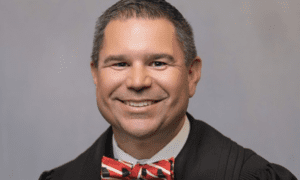Race and age played key roles in a political forum Saturday when a young black candidate for the Fayette County Board of Education asked voters to make history by electing her while a veteran white teacher stressed her experience in the classroom.
Democrat Ogechi Oparah, 23, immediately addressed her youth in the opening minutes of the event by saying the average age of Fayette County school board members is 62. Her youth, she said, would allow her to bring a much-needed younger perspective to decisions and she can also bridge the gap between parents the board. “This is a pivotal election,” she added.
A win for Oparah would give the school board its first-ever black member.
But Republican Diane Basham, 60, countered with her experience. “Every decision ends up in the classroom,” Basham said. “I’ve been on the front line for 27 years. I know the impact that decisions have. I bring my experience.” Basham is a retired teacher.
Basham and Oparah are vying for the District 4 school board seat in the first Fayette County election to be held since a court ordered the county carved into districts to create a majority black district. However, the two women are not running in the district created to fulfill the court mandate with a 51 percent black voting population.
In District 5, the majority minority district, incumbent Democrat Leonard Presberg and Dean B. Dunton, who declined an invitation to appear at the forum, are vying for the seat held by Presberg since 2011.
The school board candidates and candidates for the District 5 Fayette County Commission seat were all invited to speak at the Saturday morning political forum sponsored by the Democratic, Republican and Tea parties, the Fayette Chamber of Commerce and the Fayette County Branch of the NAACP. They were asked a series of prepared questions and questions from the audience.
School board members were asked about Common Core State Standards, the career and college readiness of Fayette County graduates, charter schools and more.
When pressed to give a yes or no answer on whether they support Common Core standards, two of the three candidates said yes. Basham, however, said she does not support Common Core.
“The one thing we control is curriculum,” Basham said. “But we have to make sure that our kids, compared to others, that ours can actually perform on those tests. I am very concerned going forward as we adopt new standards.”
Oparah said Fayette standards are set higher than those mandated by Common Core, but she agrees with a set of educational standards that allow students to learn the same material whether they are in Massachusetts or Kentucky.
Fayette teachers have been using Common Core standards in the classroom and getting good results, Presberg said. He sees no reason to change.
Candidates were also asked to talk about their priorities for the next four years if elected to office.
“I think we have a responsibility to educate every single one of our students,” Basham said. “I think they need hands on experience to get ready.” Basham and the other candidates all discussed the need to partner with local businesses and give students the opportunity to intern in areas that might interest them.
“As far as technology is concerned,” Basham added, “we need to develop plans and integrate (the equipment into the curriculum) and make them meaningful. Basham said she has seen money wasted on the purchase of equipment because no one is properly trained on its use in the classroom. “I’ve seen it first-hand,” she added.
“We’re on the same page here,”Oparah said. She attended an education camp in Fayette and saw two teachers literally in tears because they did not have time to figure out how to use new technology and integrate it into their lesson plans. “When we look at data, what parents and students want is internships, hands on experience,” she said. “It’s really important. Let’s partner with these companies.”
Presberg, who spoke about technology in his opening statement even before the question and answer period, said, “It’s no good to put technology in the classroom and have it collect dust.” He, too, wants more integration of technology into the curriculum and hands on experience for students.
The candidates didn’t differ too much in their opinions about charter schools either.
“Charter schools have a place when they’re needed,” Presberg said. A board member, he added, must look at a number of different aspects when deciding whether a charter school is a good fit for the community. For example, can the charter school offer something different to students that the traditional schools in a community are not offering.
If so, Presberg said, the board must then look into whether the charter organizer has the resources to support the school and make it successful.
Basham and Oparah both said they would have to look at available data to determine charter school impact on traditional public schools before making decisions.
“I don’t look at it (a charter school) as a threat as many people do,” Basham said. “My concern here is what is that going to do to funding for the school system.”
Oparah does not have an outright opposition to charter schools, she said. However, she would need to look at the overall picture to determine if it could be beneficial to the school system as a whole.











Leave a Comment
You must be logged in to post a comment.